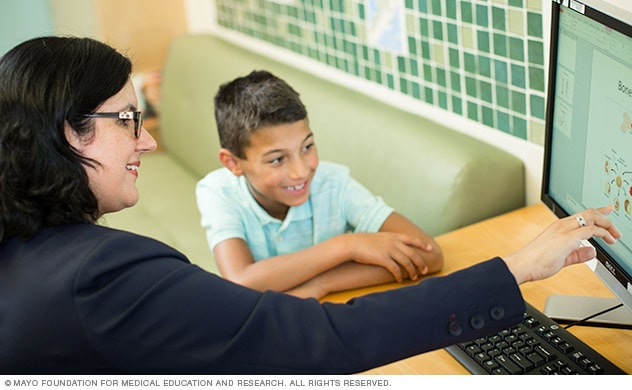 Pediatric bone marrow transplant
Pediatric bone marrow transplant
A Mayo Clinic specialist in pediatric blood diseases talks with a child about his condition.
Bone marrow (stem cell) transplant is a treatment for children and adolescents with some types of cancer and other blood disorders, including, in some cases, sickle cell anemia.
Stem cells are young blood cells that can become red blood cells, white blood cells or platelets. Stem cells are usually in the bone marrow. Some are in the blood.
At Mayo Clinic's campus in Minnesota, children and adolescents with blood disorders receive care through Mayo Clinic Children's. Children needing hospitalization receive care at Mayo Eugenio Litta Children's Hospital.
At Mayo Clinic's campus in Arizona, doctors trained in blood diseases and cancer (hematologists and oncologists) partner with Phoenix Children's Hospital to treat children who may need bone marrow transplants. Together the two hospitals oversee a single bone marrow transplant program for children.
At Mayo Clinic's campus in Florida, hematologists and oncologists partner with Nemours Children's Specialty Care and Wolfson Children's Hospital to treat children who may need bone marrow transplants.
Why choose Mayo Clinic for my child's bone marrow transplant?
In some ways, the process for bone marrow transplant in children is similar to that for adults. But because children with blood or marrow disease face unique challenges, they will benefit from the extensive experience of Mayo Clinic's bone marrow transplant doctors who treat children and adults. They are familiar with all childhood diseases and work with a team who cares for each child in an age-appropriate manner.
- The pediatric hematology and oncology experts work together with other specialists to ensure your child gets treatment tailored to his or her needs.
- The pediatric blood doctor (hematologist) directs the immunosuppression treatment after your child's transplant. These drugs are needed to help prevent your child's body from rejecting the infusion.
- A multidisciplinary team works with you and your child throughout the transplant process. This team includes a pediatric hematologist, a pediatric oncologist, an infectious disease doctor, pharmacists, dietitians, clinical nurse specialists, physician assistants and nurses. It usually includes social workers, child-life specialists, chaplains and transplant financial coordinators as well.
- When the time is right, your adolescent child will experience a seamless transition to care by adult hematologists with expertise in blood diseases and post-transplantation concerns.
Nationally recognized expertise
Mayo Clinic pediatric hematologists are leaders in researching how to improve care of children who need bone marrow transplants and also how stem cells may help treat children with other diseases. Mayo also participates in the Children's Oncology Group, made up of leading cancer experts from around the world. This affiliation makes it possible for Mayo Clinic to offer multiple research opportunities for improving care of children.
Mayo Clinic is an NCI-designated Comprehensive Cancer Center. Mayo Clinic Comprehensive Cancer Center meets strict standards for a National Cancer Institute Comprehensive Cancer Center and treats all types of childhood cancer. Board-certified pediatric cancer specialists lead a team that may include doctors in orthopedics, neurology, surgery, radiation and other pediatric specialties, along with pediatric oncology nurses.
Mayo Clinic in Rochester, Minnesota, Mayo Clinic in Jacksonville, Florida, and Mayo Clinic in Phoenix/Scottsdale, Arizona, are ranked among the Best Hospitals for cancer by U.S. News & World Report.
How do I know if my child is eligible for transplant?
The transplant team evaluates your child to determine if a bone marrow transplant would be beneficial. Even if the team determines your child is eligible, not everyone can find a suitable donor.
Mayo Clinic's blood and marrow transplant program is affiliated with Be the Match, operated by the National Marrow Donor Program, to facilitate access to unrelated donors for those who don't have related donors.
Where will the new bone marrow cells come from?
Your child's transplant may use bone marrow (stem) cells collected from a donor or from your child's blood.
What happens before the transplant?
If your child is having an autologous transplant, before the stem cells are collected he or she will need to take medicine for a few days to help the body make more blood-forming cells.
Who will perform the procedure?
Your child's bone marrow transplant will be performed by a bone marrow transplant physician with extensive experience in pediatric transplant.
How long will the transplant take?
The transplant is done in the patient's hospital room. The bone marrow or stem cells are given through a vein (intravenously), like a blood transfusion. No anesthesia is needed. The infusion can take from 15 minutes to several hours, depending on the stem cell source. But a stem cell transplant is actually a process that can take three to 18 months to complete.
What can I expect after my child's transplant?
Your child will likely be in the hospital for three to eight weeks, depending on the type of transplant. Your child may experience side effects from the medicine used to help the blood produce new cells. For example, he or she may feel achy, tired or feverish.
After leaving the hospital you and your child may need to remain close to the hospital for many more weeks to be seen in the clinic before going home. Full recovery could take anywhere from weeks to many months.
There's a chance that your child's body may reject the transplant, leading to life-threatening complications. The transplant team will monitor your child for possible rejection and work closely with your primary care provider to coordinate continuing care close to home.
Outcomes following bone marrow transplantation for children are excellent. But children who have had a bone marrow transplant may need to take extra care to avoid infections, such as colds and flu. And they'll need to visit their doctor regularly for follow-up care.
Share your experience
Share your Mayo Clinic transplant experience with others using social media.